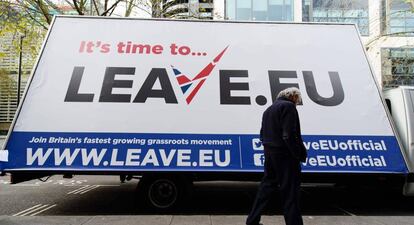Spanish exports already feeling the brunt of Brexit
New Bank of Spain report says sales of goods to UK fell last year ahead of Britain’s exit from EU

Up until now, British tourism to Spain has been largely unaffected by the United Kingdom’s upcoming exit from the European Union. But the same cannot be said for the sale of Spanish goods. According to a report by the Bank of Spain published on Thursday, the strong, consecutive growth of Spanish exports to the UK came to a halt in 2017 after five years of progress.
The report found that sales of Spanish goods to Britain fell by 6% last year, as uncertainty over Brexit caused the pound to retreat against the euro. At the same time, Spanish exports to the European Union rose by 8%. In other words, according to the Bank of Spain, Brexit is already affecting Spain’s foreign trade.
Sales of Spanish goods to Britain fell by 6% last year
The growth of Spanish exporting companies to the UK also came to a halt in 2017, falling by 0.8%. “This drop has been higher than what we have seen for other destinations,” says the Bank of Spain report.
According to the Office of the State Secretary of Commerce, 7% of all Spanish exporting companies trade with the United Kingdom. Between 2012 and 2017, the number of exporting businesses jumped by 8% to 11,695 – a fourth of which only sell to the British islands. These companies are considered to be “the most vulnerable” by the Bank of Spain and even more at risk if their products are difficult to replace.
Spain’s agri-food and automotive sector will be the hardest hit by Brexit
Although 85% of Spanish businesses that trade with the United Kingdom are small to medium-sized enterprises (SMEs), the lion’s share of sales is made by large companies which are “on average bigger, more productive and more geographically diversified than those which export to the main countries within the monetary union,” says the Bank of Spain. This, the document argues, could help limit the impact of Brexit.
According to the Bank of Spain, the agri-food and automotive sector represent nearly half of all exports, with the latter responsible for most of last year’s drop in sales.
Economic slowdown
The UK is Spain’s fifth biggest trading partner, representing 7% of all Spanish sales abroad. Spain, in contrast, is not a big importer of British goods, making up only 4% of the UK’s sales abroad.
Britain’s GDP grew by 0.6% in the final quarter of 2017, buoyed by the export of goods and services. According to the Bank of Spain, this occurred largely because of the falling value of the pound, which lost a yearly average of 7% against the euro in 2017.
But the European Commission has predicted a slowdown of the British economy. The commission’s spring forecast reported that growth of individual consumption will be modest, due to the historically low savings rate and the fact that salaries have not risen above the rate of inflation. Uncertainty over Brexit will also weaken investment, the forecast said.
The UK is Spain’s fifth biggest trading partner
The Bank of Spain reports that the medium and long-term effects of Brexit on Spanish companies in the UK or those thinking of entering the British market will be determined by the final terms of the Brexit agreement. In a situation of “elevated uncertainty,” the scenario could range from preserving most commercial partnerships between London and EU nearly intact, to having them regulated by the World Trade Organization, explains the report.
According to the National Institute of Statistics (INE), exports of non-tourist services to the UK – a sector that generates €6 billion a year as opposed to €19 billion in goods – have seen a different trajectory. Growth slowed down just before the Brexit referendum in June 2016, then picked up again. This could be because these services are more integrated into the global value chain and less vulnerable to currency fluctuations.
According to the Economy Ministry, Spanish investment in the UK has dropped from nearly €9 billion in 2016 to €571 million in 2017.
Tourism

Brexit also represents a potential threat to Spain’s tourism industry, as British visitors make up 23% of all tourists and represent 21% of all revenue in the sector. For now, the number of tourists from the UK continues to grow, albeit at a slower rate than in 2016 when it hit double digits. A report by Swiss financial firm UBS, named Spain: A fading tourism boom, says the slowed growth rate is due in part to the growing number of British tourists who are choosing destinations like Turkey, Egypt and Tunisia over Spain and Portugal.
While the impact of Brexit on Spain’s tourism industry has not yet been “discernible,” “it could have greater negative impacts if the slowdown continues, reducing the purchasing power of British people and translating into fewer visitors, overnight stays and daily expenditures,” concluded the UBS paper.
English version by Melissa Kitson.
Tu suscripción se está usando en otro dispositivo
¿Quieres añadir otro usuario a tu suscripción?
Si continúas leyendo en este dispositivo, no se podrá leer en el otro.
FlechaTu suscripción se está usando en otro dispositivo y solo puedes acceder a EL PAÍS desde un dispositivo a la vez.
Si quieres compartir tu cuenta, cambia tu suscripción a la modalidad Premium, así podrás añadir otro usuario. Cada uno accederá con su propia cuenta de email, lo que os permitirá personalizar vuestra experiencia en EL PAÍS.
¿Tienes una suscripción de empresa? Accede aquí para contratar más cuentas.
En el caso de no saber quién está usando tu cuenta, te recomendamos cambiar tu contraseña aquí.
Si decides continuar compartiendo tu cuenta, este mensaje se mostrará en tu dispositivo y en el de la otra persona que está usando tu cuenta de forma indefinida, afectando a tu experiencia de lectura. Puedes consultar aquí los términos y condiciones de la suscripción digital.









































